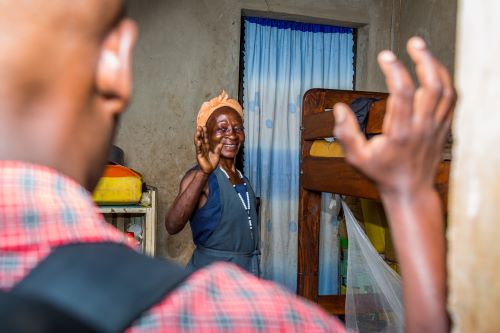Envisioning empowerment: Mapping the paths of widowhood in Northern Uganda
DOI:
https://doi.org/10.21153/thl2024art2004Keywords:
SIDINL, empowerment, widows, UgandaAbstract
The traumatic experiences of widows in Northern Uganda are in a subtle intersection of cultural practices, social stigma, and the impacts of widowhood on their mental and physical health. Utilising data from local ‘Specialised, In-Depth Information & Newsletters’ (SIDINL), this analysis captures a comprehensive narrative of widowhood through online platforms that serve as micro-humanitarian networks. These networks enable widows to share their stories, access support, and engage in a communal healing process facilitated by local therapists and humanitarian workers. Using Solution-Focused Brief Therapy (SFBT), these interventions aim to foster resilience and positive change among the different types of widows. Culturally sensitive and community-based approaches address the unique challenges of this local context such as the polygamous marriage balance, childlessness, and land grabbing issues. The findings advocate for humanitarian leaders at all levels to tailor strategies to empower all people in crisis, by integrating legal, economic, and psychological support to transform their roles from passive recipients to active participants in their healing and empowerment journeys.
Downloads
References
Asiimwe, J. (2001). Making Women’s Land Rights a Reality in Uganda: Advocacy for Co-Ownership by Spouses. Yale Hum. Rts. & Dev. LJ, 4, 171.
Dube, M. (2022). Isolation and its impact on widows: Insights from low-resourced communities in Binga District, Zimbabwe. Social Sciences, 11(7), 298.
Ebersöhn, L., Loots, T., Mampane, R., Omidire, F., Malan‐Van Rooyen, M., Sefotho, M., & Nthontho, M. (2018). An indigenous psychology perspective on psychosocial support in Southern Africa as collective, networking, and pragmatic support. Journal of Community & Applied Social Psychology, 28(5), 332-347.
Fasanmi, A., & Ayivor, S. (2021). Widows, widowhood, and society in Africa. In The Palgrave Handbook of African Women’s Studies (pp. 2269-2286). Cham: Springer International Publishing.
Huisman, D. M., & Lemke, A. (2022). I am this widow: Social support in friendship after the loss of a spouse in mid-life. OMEGAJournal of Death and Dying, 86(1), 45-64.
International Justice Mission. (2014). Property Grabbing from Ugandan Widows and the Justice System: A Mixed-Methods Assessment in Mukono County, Uganda.
Joubert, J., & Guse, T. (2021). A Solution-Focused Brief Therapy (SFBT) Intervention model to facilitate hope and subjective well-being among trauma survivors. Journal of Contemporary Psychotherapy, 51(4), 303-310.
Karanja, L. (2003). Just Die Quietly, Domestic Violence and Women’s Vulnerability to HIV in Uganda (Vol. 15, No. 15). Human Rights Watch.
Kassaw, C., & Shumye, S. (2021). The prevalence of suicidal behavior and its associated factors among wives with polygamy marriage living in Gedeo zone, southern Ethiopia, 2020. PloS one, 16(10), e0259029.
Mahat Shamir, M., & Leichtentritt, R. D. (2023). Navigating the paradox: Strategies utilized by pregnant widows in an attempt to reconcile life and death. Death Studies, 1-11.
Mezzanotte, K. S., Bhardwaj, A., Kim, Y., Rimal, D., Lee, J. K., Shrestha, A., ... & Surkan, P. J. (2022). Social determinants of impaired functioning among Nepali widows: A mixed methods study. Global public health, 17(12), 3853-3868.
Motsoeneng, M., & Modise, M. A. (2020). Grieving widows’ lived experiences in a rural South African setting. Journal of Psychology in Africa, 30(3), 264-267.
Mwaka, B. O. (1998). Widowhood and property among the Baganda of Uganda: uncovering the passive victim (Doctoral dissertation, University of Warwick).
Nsokele, C. M., & Kika, F. K. (2024). Local knowledge and information initiatives in the conflict-affected eastern Democratic Republic of Congo. Development in Practice, 1-15.
Nwaoga, C. T., Uroko, F. C., Okoli, A. B., & Okwuosa, L. (2021). Widowhood practices and the church in south-east Nigeria. HTS Teologiese Studies/Theological Studies, 77(1).
Thomas, T. A. (2021). Social support experiences of spousally bereaved individuals in a South African township community: The Botho/Ubuntu perspective. Frontiers in Psychology, 12, 604987.
Tshaka, A., Tanga, P., & Ntshongwana, Z. (2023). Socio-Economic Challenges Experienced by Widows and Support Provided by Social Workers in Raymond Mhlaba Local Municipality in Eastern Cape, South Africa. Southern African Journal of Social Work and Social Development, 35(3), 21-pages.
Ude, P. U., & Njoku, O. C. (2017). Widowhood practices and impacts on women in Sub-Saharan Africa: An empowerment perspective. International social work, 60(6), 1512-1522.
Ugwu, D. I., Orjiakor, C. T., Ugwu, L. I., Ezedum, C. E., Ngwoke, O. R., & Ezebuilo, C. (2020). Narratives of childless widows: Exploring the lived experiences and well-being of childless widows in rural Nigeria. International journal of qualitative studies on health and well-being, 15(1), 1713657.
Uganda Bureau of Statistics. (2021). Uganda National Survey Report 2019/2020. Kampala, Uganda; UBOS
UN Women. (2023). UN Women Uganda Q4 Newsletter 2023. UN Women Uganda Draft Q4 Newsletter 2023.pdf
Wirastri, T. D., & Van Huis, S. C. (2021). The second wife: Ambivalences towards state regulation of polygamy in Indonesia. The Journal of Legal Pluralism and Unofficial Law, 53(2), 246-268.







